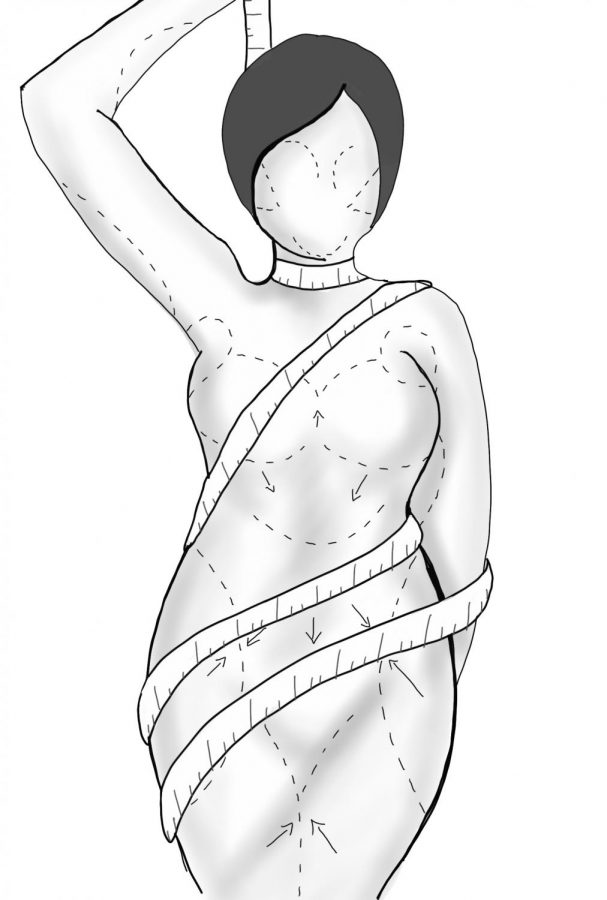Checking Up: Media sets unrealistic expectations for body image
April 2, 2015
According to a 2013 eMarketer study, a research firm, the average American spends approximately 12 hours a day looking at major media including digital devices, TV, radio and print. Ultimately, we spend about half of our day indulged in media, and we the people have little control as to what we are being exposed to.
The advertisements we watch on a daily basis present unrealistic expectations of how the human body should look and act. Women and men are shown to us in ways that are supposed to portray perfection. These unreasonable standards shift society’s values to a more materialistic and consumerist culture.
We often see products being sold through the over-sexualization of women. This sales approach only enhances gender stereotypes, which act as the roots of consumerism and tell us which products are meant for a man and which products are meant for a woman.
Dustie Hoffman, a junior, said her figure is one thing she is most self-conscious about.
“As a woman, I personally feel like I have to meet a standard of perfection when it comes to the way I look. Victoria Secret always mails me magazines and every time I look at them I wonder how it is even possible to look the way they do. I think all women see things like that and immediately become uncomfortable in their own body.”
According to the National Eating Disorder Association, the media play a large role in women being dissatisfied with their bodies. A woman’s craving for self-acceptance can be satisfied if she looks like the women that society have placed on a pedestal—the women we see on TV. Being exposed to this type of negative media has the potential to lead to self-hatred, which may result in body mutilation, starvation and even taking extreme measures to morph physical traits into something they think society can tolerate.
It is often overlooked, but the same unrealistic expectations that are placed upon women are also placed upon men. Most of the men that we see in the media are chiseled, tan and are able to attract any type of partner they desire. There are also advertisements directed towards men that market products that will “fix” their physical appearance, such as supplements that will make them stronger.
According to the National Center for Biotechnology Information, during the adolescent years, there is a significant increase for girls in regards to body dissatisfaction, and there is a slight decrease in boys. In general, boys are less concerned about their physical appearance during their teenage years.
“Men on TV are always athletic, have nice bodies and never have any acne or anything wrong with them,” says Jeremiah Wayne, a junior at Gatton Academy. “Men are portrayed as being ‘sexy,’ but it’s easier for boys to overlook stuff like that than it is for girls because girls are usually more self-conscious. I can’t say that I have ever felt bad about myself because of something I have seen on TV, but I definitely think the media portrays men unrealistically.”
Although media is definitely not going anywhere, there are companies and products, such as The Dove Campaign For Real Beauty, that are on a mission to prove that each individual is beautiful the way they are and that falling under societal pressures to be a fictitious version of yourself is absolutely no way to live. As college students, we can attempt to make a change by focusing on bettering ourselves internally, putting aside our reliance on products that attempt to fix us externally.













![Students cheer for Senator at Large Jaden Marshall after being announced as the Intercultural Student Engagement Center Senator for the 24th Senate on Wednesday, April 17 in the Senate Chamber in DSU. Ive done everything in my power, Ive said it 100 times, to be for the students, Marshall said. So, not only to win, but to hear that reaction for me by the other students is just something that shows people actually care about me [and] really support me.](https://wkuherald.com/wp-content/uploads/2024/04/jadenmarshall-1200x844.jpg)










